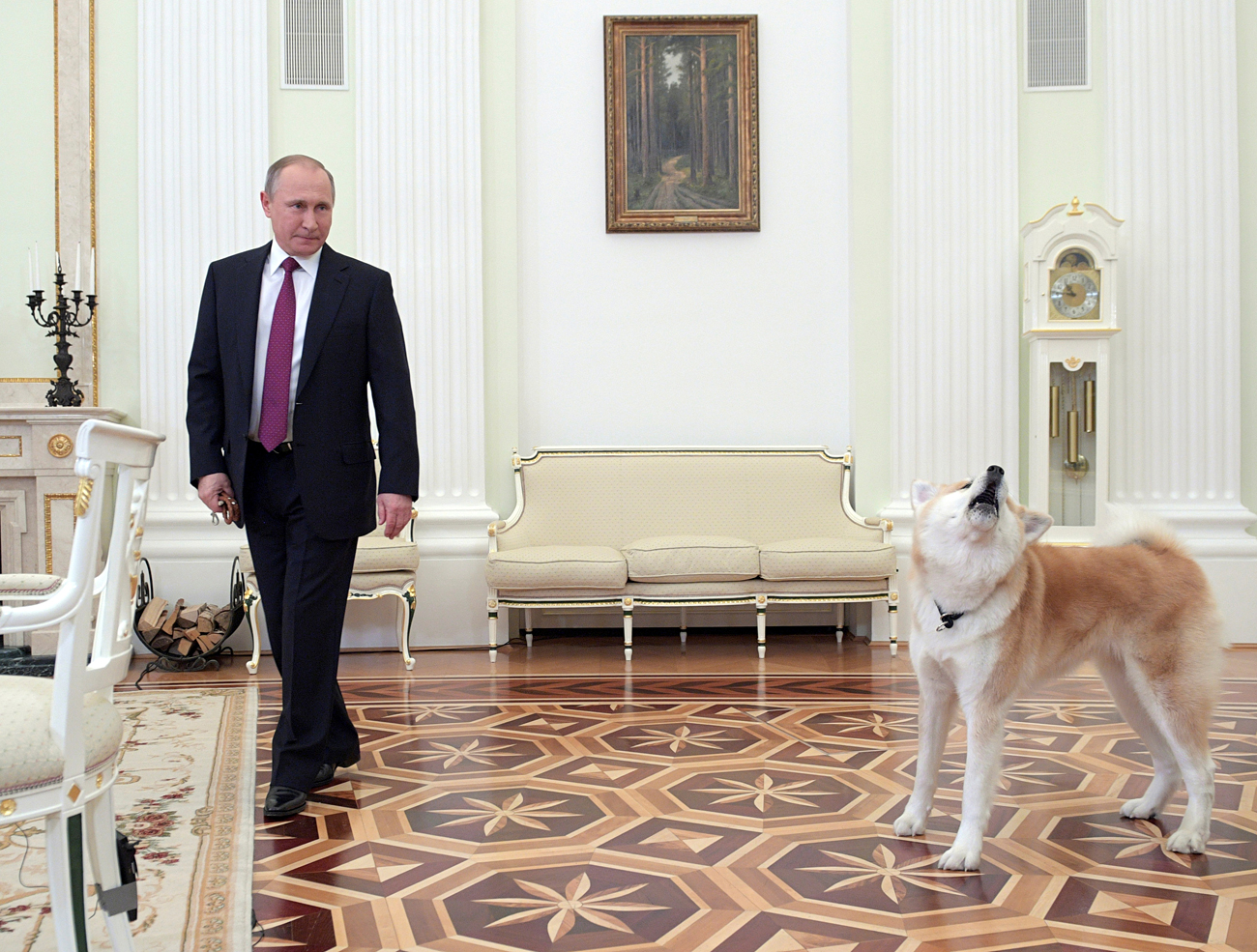
Russian President Vladimir Putin enters a hall with his dog Yume before giving an interview to journalists from Japan.
ReutersOn the eve of the December summit between Russian President Vladimir Putin and Prime Minister of Japan Shinzo Abe, the latter wanted to give the Russian leader a male partner for a female Akita Inu called Yume, which was presented to Putin in 2012. In a gesture that may have highly offended the Japanese, the Kremlin declined to accept the gift.
Looking to reduce any awkwardness surrounding the refusal, Putin took Yume to a meeting with Japanese journalists. This became one of the most widely publicized events in Russia-Japan relations in recent times.
Putin told the journalists that Yume had a short temper and always protected his master. He called Yume a “no no-sense” dog.
Yume was a present from the government of the Akita Prefecture to express Japan’s gratitude for Russian assistance in the aftermath of natural disasters in March 2011. As a return gift, the Russian President presented a Siberian cat to Akita Governor Norihisa Satake.
In Russia the perception of a gift is very different than in Japan, Maria Kikteva, a Japanologist from Moscow’s Higher School of Economics told Gazeta.ru. The Kremlin, apparently, did not consider the refusal of the gift as a signal of toughening its negotiating position before the important summit.
Valery Kirsanov, Head of the Center for Japanese studies, Institute for Far Eastern studies, sees the Kremlin's refusal to accept a gift from Tokyo as a practical decision. “The dog he was presented with in 2012 is female,” Kirsanov said. “Now they wanted to present a male-partner, which would mean the dogs could have puppies. But Putin already has other dogs [to look after].”
In 2000, when Putin officially became head of state, Sergei Shoigu gave him a black Labrador named Connie, who was very popular in Russia and was even featured as a comic book hero.
During a visit to Bulgaria, Prime Minister Boyko Borisov gave Putin a Bulgarian Shepherd. Putin was so delighted with the gift that he kissed the dog immediately. To find a suitable nickname for the dog, a countrywide competition was announced, which was won by a five-year old boy, who suggested the nickname Buffy.
 Richard Gere played the role of the owner of Hachiko in a 2009 American film. Source: kinopoisk.ru
Richard Gere played the role of the owner of Hachiko in a 2009 American film. Source: kinopoisk.ru
The Akita Inu breed is among the oldest in the world. They were used as guard dogs and were renowned as excellent hunters that could single-handedly kill a bear.
Later Akita Inu became a symbol of aristocracy. The dogs had their own apartments and servants, who communicated with them in a special language.
The breed is highly valued in modern Japan. Tokyo even has a monument to Hachiko, an Akita Inu from the 1920s that is revered by the Japanese people.
Hachiko’s owner Professor Hidesaburo Ueno would commute daily to work, and the dog would leave their house to greet him at the end of each day at a nearby railway station. They continued this routine every day until the day the professor died in 1925. Hachiko would go to the railway station every single day for the next nine years, hoping to greet the professor.
Thanks to Hachiko, this Akita Inu breed is considered a symbol of loyalty and devotion.
Hachiko’s story was featured a Japanese film in 1987 and a 2009 American film, where Richard Gere played the role of the owner.
First published in Russian by Gazeta.ru
All rights reserved by Rossiyskaya Gazeta.
Subscribe
to our newsletter!
Get the week's best stories straight to your inbox